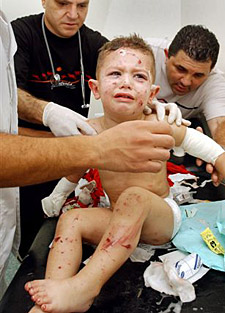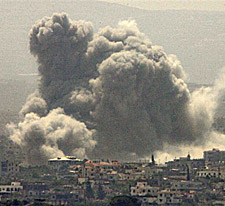As the bitter struggle between Israeli and Hezbollah forces enters its 16th day, local and international Christians seem divided on everything but the need for peace.
Martin Accad, the Dean of the Arab Baptist Theological Seminary in Lebanon, is sickened by the combatants and the destruction they have brought to his country.
"I am angry at self-centered Hezbollah, which has done the inadmissible of taking a unilateral war decision without consulting the Lebanese government of which it is part," he says.
"I am angry that citizens of a nation like Israel, who have so suffered at the hands of others, would allow themselves such an out-of-proportion reaction, oh-so-far from the “eye-for-an-eye and tooth-for-a-tooth” principle that we might have forgiven them."
But Mr Accad reserves equal condemnation for passive politicians.
"I am just as angry at"”I have lost hope in"”the international community that is keeping silent and not even budging with an official condemnation of this senseless instinct of extermination.
"According to the Lebanese health minister, Israel is even using phosphoric bombs, which are forbidden under international conventions! Are my people to consider Iran more dangerous than this?"
Lebanese divided by destruction
 However the Washington Post has reported that some Lebanese Christians are prepared to suffer the conflict if it means removing a perceived Hezbollah strangle-hold Hezbollah on their country.
However the Washington Post has reported that some Lebanese Christians are prepared to suffer the conflict if it means removing a perceived Hezbollah strangle-hold Hezbollah on their country.
"Islam is controlling us, and we’ve known that for a long time,” says18-year-old George Khouri, a member of a Christian party.
"If we don’t have weapons, then no one should have weapons. If Hezbollah keeps its weapons, then why shouldn’t we have them?” asks 21-year-old Joseph Muhanna, his friends nodding.
Calls for more than prayer
The Anglican Bishop in Jerusalem, the Rt. Rev. Riah H. Abu El-Assal is praying cooler head will prevail as he organises a mission to Lebanon next week to bury the dead and comfort the victims of war.
"Perhaps as others have you will ask, "What can I do?'," he writes to Christians abroad.
"Certainly we encourage and appreciate your prayers. That is important, but it is not enough. If you find that you can no longer look away, take up your cross. Write every elected official you know. Write to your news media. Speak to your congregation, friends, and colleagues about injustice and the threat of global war."
Bishop El-Assal reserves his sharpest criticisms for what he describes as the Israeli government's "opportunistic' attempts to destroy their "perceived enemy'.
"The "situation" as it has come to be called, has deteriorated into a war without boundaries or limitations," he says.
Dr David Gushee, the professor of Moral Philosophy at Union University and noted American Baptist lecturer lays some blame at the feet of politically influential Christian elements enamoured by "apocalyptic messianism'.
"Because the Bible says so, I believe that one day Christ will return and at last (praise God) every tear shall be wiped away and all this killing will end," he says.
"But elaborate end-times scenarios that conveniently involve apocalyptic warfare in the Middle East repulse me. They are speculative creations that go beyond the Bible’s own specific teachings [and] they cut the nerve of moral effort to make peace and work for justice right here and right now."
Local Christians preach peace admidst rockets
 As the international community debates causes and solutions to the Israeli-Lebanese crisis, that quest for peace and justice appears to be left in the hands of Christian civilians on both sides of the border.
As the international community debates causes and solutions to the Israeli-Lebanese crisis, that quest for peace and justice appears to be left in the hands of Christian civilians on both sides of the border.
Botrus Mansour, an Arab Christian and general director of Nazareth Baptist School, has been watching Hezbollah rockets rain down within kilometres of his home.
"Our calling as the remnant of Christians in the birthplace of our faith is to pray for the people of this broken land," he says.
"As followers of Christ, we should share with courage the prophetic message of the truth. Leaders in the Middle East have failed in bringing us into an era of peace. The voice of the peacemaker urging reconciliation in the midst of enmity and hostility should be heard clearly."
On the other side of this increasingly cratered land-scape Riad Kassis, the Christian director of another school in West Bekaa, Lebanon, says he is praying for "an awakening of the human conscience'.
As Israeli jets scream overhead he challenges the church to take action.
"I am encouraged by the ability of the worldwide Christian church to speak about peace and to run seminars on conflict resolution, but disappointed with its ineffectiveness to work for a real and just peace," he writes.
"At the same time, I am encouraged to know that many Christian sisters and brothers are concerned for our situation in Lebanon. They are praying and encouraging us, in spite of their helplessness to influence their governments."
Sydneyanglicans.net gratefully acknowledges the assistance of Christianity Today Magazine where many of these accounts can be read in detail
Photos courtesy Arabist
EDITOR’S WARNING: This photo-stream contains graphic content deemed to be extremely disturbing























